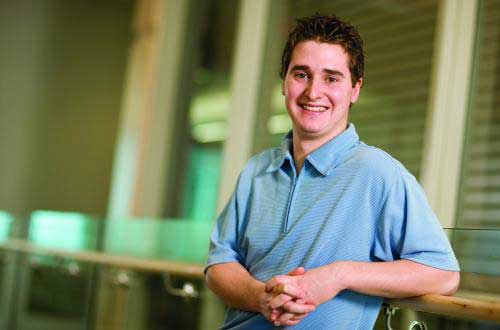Matt Mitschke remembers when he heard about the new Bachelor of Health Sciences in Public Health degree program at the University of Lethbridge. Until then, he wasn't entirely sure what he wanted to study, or the kind of career he wanted to pursue. But after looking into the program and realizing that he would be taking a wide range of interesting classes that would in turn open a lot of doors at the end of four years, he knew he'd found something exciting.
Mitschke enrolled in the program's very first semester, which began in fall 2008, joining a small but eager group of new students in the School of Health Sciences.

Matt Mitschke, U of L public health student.
"I like the entire philosophy of the program," Mitschke says. "It's an upstream approach to health-care, identifying and preventing health- related issues before they actually happen."
The Bachelor of Health Sciences in Public Health degree is the only baccalaureate program of its kind in Alberta. Students in this non-clinical program choose between three broad areas of study: applied public health practice, health policy and promotion, and public health promotion.
In keeping with the tradition of liberal education at the University of Lethbridge, the program requires students to take a breadth of classes in different disciplines – ranging from sociology and psychology to anthropology and kinesiology. The School of Health Sciences developed the program in conjunction with the Faculty of Arts and Science as well as the Faculty of Management to ensure graduates would emerge as critical thinkers in the field of health care, educated in a variety of disciplines and therefore equipped to approach public health issues in a comprehensive way.
"The program is unique in that it focuses on public health promotion, research and management rather than clinical aspects of health care," says Dr. Chris Hosgood, dean of the School of Health Sciences. "It combines social science disciplines with the concepts of public health and gives the School of Health Sciences greater diversity. The program allows us to collaborate with very respected Faculties at the U of L, and has brought us much closer to the centre of academic life on campus."
The School of Health Sciences will officially become a Faculty at the U of L on May 1, 2009.
Sharon Yanicki, public health program coordinator, believes the program will create awareness about what public health actually is, ease the employment crunch within the current health-care system and help to improve the overall health of many people.
"This degree is filling a niche," Yanicki says. "The majority of people working in the field of public health right now are nurses, who are in very short supply. We expect the program to fill positions in public health in a way that better supports the health-care system."
Public health workers are employed in a variety of areas, studying trends, recommending strategies and implementing plans for good health. A public health worker might focus on healthy aging, good nutrition in schools, access to physical activities or health patterns in a particular ethnic group.
Although the field of public health isn't new, it's an area that isn't all that well known or understood. The program aims to change that, and provide a new type of health-care worker who will work both on the frontlines and behind the scenes to help people make healthy choices and create healthier populations.
"The determinants of good health are varied and complex," Yanicki says. "The Public Health degree program educates students on the range of factors that impact health and addresses the need for trained public health workers in emerging areas, such as risk and health communications, information management, and surveillance and analysis of broad socio-demographic data."
To kick off the program, a scholarship fund was established that provides $4,000 to each newly accepted full-time student. An additional $2,000 is also available to students who qualify. The first group of graduates will receive their bachelor's degree in public health in the spring of 2011.
